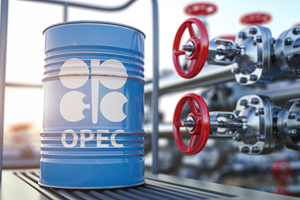OPEC+ debating next move as U.S. presses for more oil
(Bloomberg) — The oil pact OPEC+ launched at the outset of the pandemic is finally nearing an end, and where the group goes from here is a politically fraught question.
By August, the last of the huge oil-output cuts the group made in 2020 will have been rolled back and delegates from the 23-nation coalition say they are now grappling with what comes next.
As President Joe Biden prepares to visit Saudi Arabia -- OPEC’s de facto leader -- US officials are laying the ground for the kingdom and its neighbor, the United Arab Emirates, to move beyond their August production levels and announce further increases to help cool oil prices that are above $110 a barrel, according to people familiar with the matter.
Right now the Persian Gulf exporters, seeking guarantees on regional security before they agree to pump at levels rarely seen before, are still weighing their options, the people said, asking not to be named because the information isn’t public.
Saudi Arabia has been walking a fine line between heeding the requests from its longtime but somewhat estranged American ally, and the joint architect of the alliance that rescued oil prices from their worst slump in history -- Russia.
In a show of support for the increasingly ostracized nation, Saudi Energy Minister Prince Abdulaziz bin Salman traveled to St. Petersburg International Economic Forum this week, posing for a photograph with Russia’s Deputy Prime Minister Alexander Novak and describing relations between the two capitals as “good.”
Yet earlier this month, also Riyadh showed some sympathy for oil consumers’ distress by steering the group to accelerate production increases in July and August by 50%.
“OPEC has a long history of being pragmatic amid turbulent geopolitics,” said Bjarne Schieldrop, chief commodities analyst at SEB AB. “They want to have the shine of being seen as a ‘responsible’ actor.”
Limited Capacity
In theory, the accelerated timetable for OPEC+ increases adds up to 648,000 barrels a day in each of those months. But the figure is largely symbolic, with most members of the Organization of Petroleum Exporting Countries and its partners unable to increase production further. The only spare capacity is confined to just a few Middle East members.
Once they reach the targets specified for August by the current agreement, the Saudis and the UAE will have roughly another 2.2 million daily barrels of unused output to deploy, data from the International Energy Agency in Paris show.
That’s about 2% of global supply, and with soaring prices threatening to tip the global economy into recession, plus sanctions on OPEC+ member Russia stoking further turmoil, consumers will welcome any relief they can get.
“There might be some Saudi nod in the direction of releasing more oil, but there’s the realization that there’s a limit now to what they can do,” said Bill Farren-Price, a director at Enverus Intelligence Research.
Political Leverage
The Saudis are considering whether to assent to the request but, with the kingdom enjoying its greatest political leverage for several years, it’s unclear whether an agreement will be reached, according to people familiar with the negotiations.
Other OPEC+ nations are quietly swapping views on the best way to proceed, delegates said. Ministers will consider the next steps either at an online meeting on June 30, or, at the latest, a subsequent gathering in late July or early August.
In the wider coalition, some members privately question whether the group should acknowledge its constraints by shifting to a less formal approach, delegates said. The system of output quotas in place since late 2016 could be relaxed, allowing the few countries with capacity to produce at whatever level is needed, some countries have suggested.
Meetings may no longer be needed at the monthly pace largely in effect since the pandemic erupted in 2020, they said. Before Covid-19, the cartel typically gathered every six months.
It’s unclear though whether such a shift would be endorsed by Riyadh, which has repeatedly stressed that global markets are reassured by OPEC’s careful management style. The kingdom wishes the next step to be a consensual, group-wide decision, according to one delegate.
Political Stakes
Biden’s visit will underscore how Russia’s invasion of Ukraine has tilted the power balance in Saudi Arabia’s favor. Four years after he condemned the kingdom and its de-facto leader Crown Prince Mohammad bin Salman as a “pariah” over the killing of critic Jamal Khashoggi, the US president needs their help.
Without additional Saudi barrels, there’s little chance of taming the inflation that’s battering the US economy. The kingdom’s oil is also vital to support international efforts to isolate President Vladimir Putin over the invasion of Ukraine.
On the other side is the almost six-year alliance with Moscow, which has amplified OPEC’s influence over the oil market. The dangers of a breakdown in relations between the two producers were illustrated during the brief price war of April 2020.
Russia “continues to be part” of the oil exporters’ group, OPEC Secretary-General Mohammad Barkindo said in London on Thursday. “We want to have long-lasting, sustainable relations with these producing countries.”



